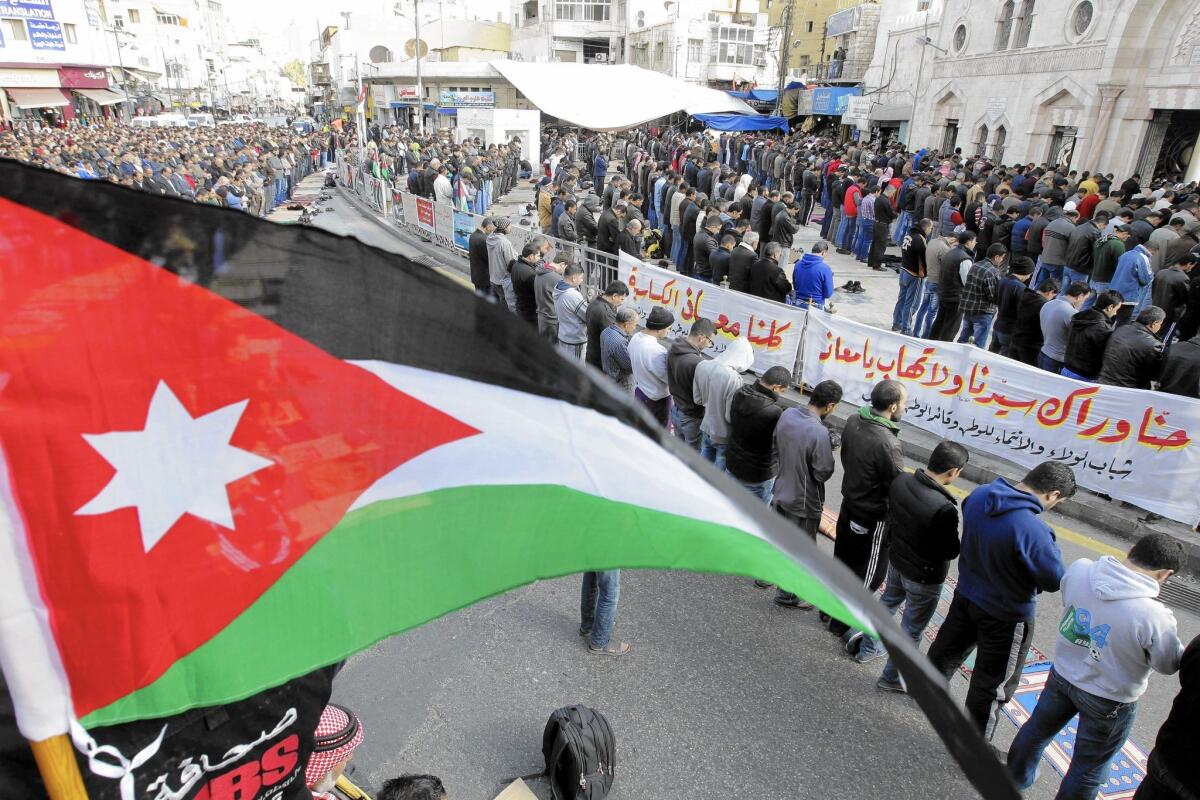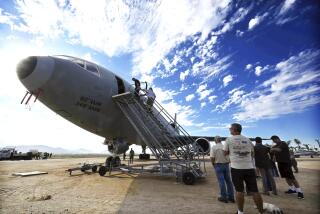Captured Jordanian pilot’s relatives come together in show of support

- Share via
Reporting from Karak, Jordan — Dozens of men with grim faces filed like mourners up a dirt path into the cavernous hall of the Kasasbeh tribal office, or diwan.
But there was no funeral.
They had come to this medieval fortress city about 55 miles south of the capital to support a relative who is missing: Moaz Kasasbeh, the Jordanian air force pilot seized by Islamic State militants Wednesday after his F-16 crashed near the northeastern Syrian city of Raqqah.
Months ago they had gathered here for Kasasbeh’s wedding, the diwan sporting decorations, the crowd spilling out onto the lawn.
This time, the 26-year-old newlywed’s fate was uncertain.
But the pilot’s father told supporters that he felt reassured after meeting with King Abdullah II that the government was doing all it could to free his son.
“His majesty pointed to his son in front of me and said, ‘Moaz is like him to me,’” Safi Kasasbeh said.
Jordan is one of several Arab nations that joined the U.S. coalition’s air campaign against Islamic State in Syria and Iraq. The airstrikes support Iraqi and Kurdish fighters trying to retake ground lost to militants during the summer.
When the campaign began in September, Jordan, a staunch U.S. ally, took part in some of the first airstrikes against Raqqah, now the de facto capital of Islamic State’s self-styled caliphate, which has extended into northern and western Iraq, including Anbar province.
“Jordan was one of the most enthusiastic members of the coalition after Daesh came close to its borders from Anbar,” said Fahd Khitan, a Jordanian political analyst, referring to Islamic State by its Arabic acronym.
The effect of Kasasbeh’s capture on the coalition was not yet clear this week, although Jordan’s populace was clearly shaken.
Chilling images appeared online soon after the crash showing jubilant militants manhandling a frightened Kasasbeh, claiming they had shot down his warplane using a heat-seeking missile, a claim the Pentagon and the Jordanian military disputed.
The pictures served as a stark reminder of the civil war raging in neighboring Syria.
Jordanians responded with a Twitter campaign: “We are all Moaz.” Queen Rania joined the campaign, adding a picture on her Instagram page of the pilot’s name in Arabic in the shape of a warplane colored with the Jordanian flag. One Jordanian reportedly named his newborn after the pilot.
The U.S. ambassador in Amman expressed her support for “the brave Jordanian pilot and his family” in a Facebook post.
“The U.S. government and the U.S. Embassy in Amman are working in close cooperation with the government of Jordan to ensure his safe return,” Ambassador Alice G. Wells wrote. “We stand together in confronting extremism, and we appreciate Jordan’s role in advancing peace and moderation in the region.”
But some Jordanians no longer support the airstrike campaign and said the pilot’s capture is a reminder that the country will pay a price for fighting on behalf of Syria and Iraq.
“I understand Jordan defending its borders, that’s fine,” said an off-duty policeman making the 82-mile trek back to Amman from Karak. “But Raqqah? There are people there who can fight for it. This isn’t our business.”
But political discussions were irrelevant to the pilot’s family Friday, who appealed to the militants to release him based on his piety.
“Moaz is a Muslim who prays at dawn, memorizes God’s words and always carries the Koran with him,” said Jawdat Kasasbeh, one of the pilot’s two older brothers and a university lecturer in telecommunications engineering.
He had been answering phone calls from supporters all morning.
“In the name of the family, we call upon the Islamic State to treat Moaz like a guest, for he is a Muslim and a brother to them,” he said.
The pilot, like his Islamic State captors, is a Sunni Muslim.
It was unclear Friday whether Jordanian government officials had contacted Islamic State militants to negotiate the pilot’s release.
Relatives said they did not have any information about negotiations.
One of Kasasbeh’s cousins, Faisal, said officials had told the family that the pilot might be handed over in exchange for the release of jailed militants, perhaps Sajida Rishawi and Ziyad Karbouli.
Rishawi was a would-be suicide bomber whose explosives belt failed to detonate during a 2005 attack on Western hotels in Amman that killed 38 people. Karbouli was convicted of terrorism-related charges in 2006.
Government spokesman Mohammad Momani declined to comment on a possible prisoner exchange.
For Faisal Kasasbeh, the calculus was simple: “Let them have them. Just give us back Moaz.”
Bulos is a special correspondent.
More to Read
Sign up for Essential California
The most important California stories and recommendations in your inbox every morning.
You may occasionally receive promotional content from the Los Angeles Times.













